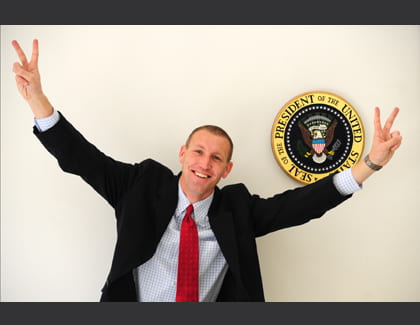President Obama pushes the stimulus bill
Matthew Beckmann studies how presidents push their policy proposals in Congress and the consequences of partisan polarization

The U.S. Senate has passed President Obama’s $838 billion economic recovery plan, but Democrats and Republicans will negotiate further before voting on the final bill.
Matthew Beckmann, UC Irvine political science assistant professor, studies how presidents push their policy proposals in Congress and the consequences of partisan polarization in Washington. Beckmann weighs in on how Obama is handling the first major challenge of his presidency: garnering bipartisan support for a bill to help the country bounce back from economic crisis.
Q: Why does President Obama feel it’s necessary to promote his stimulus package directly to the public in Indiana and Florida?
A: Contrary to popular portrayals, presidents pull few formal levers on Capitol Hill; Congress ultimately decides the nation’s laws. All presidents face the same challenge: how to persuade legislators to adopt the president’s point of view. On that score, nothing moves legislators like a clear message from voters. That is why Obama, like his recent predecessors, brought campaign-style events with him into his presidency.
Q: Republicans and Democrats are divided over key elements of the stimulus package, such as spending and tax cuts. What impact could this disagreement have on Obama’s future policy proposals given his wish to promote bipartisanship?
A: It is clear that the last half-century has seen increased polarization in Washington. Conservative Democrats and liberal Republicans now are few and far between, so much so that political commentator and humorist Jim Hightower’s aphorism “There’s nothing in the middle of the road but yellow stripes and dead armadillos” is applicable. Accordingly, Obama’s efforts at broad bipartisan support on controversial issues will prove futile. His best bet for bipartisanship will be to continue securing the support of a few moderate Republican senators.
Q: Public opinion polls show overwhelming support for Obama’s handling of the stimulus bill. What can he do to sustain this support?
A: At the end of the day, public opinion of the president depends heavily on the state of the country. Reality matters. After the honeymoon, President Obama’s first and last option for staying popular is turning around an economy that regularly evokes comparisons to the Great Depression.
Q: Obama says not passing the stimulus package would be a disaster for America. What impact do you think further delay would have on Obama’s presidency and ability to govern?
A: President Obama and Democratic leaders in Congress are going to pass a major stimulus package. Unfortunately for them, that’s probably the easiest issue on the docket. The next issues – another banking “rescue” and some sort of housing assistance bill – are programmatically complicated and politically thorny. Follow those up with healthcare and/or energy (again, both notoriously complex and contentious), and you have the potential for the most consequential Congress since Lyndon B. Johnson and the 89th. Of course, it could be ineffective as well, such as George W. Bush and the 110th Congress.